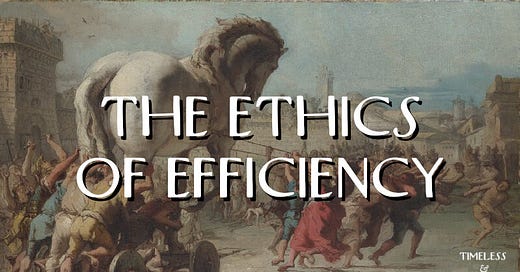
“I think technology really increased human ability. But technology cannot produce compassion.” — Dalai Lama
What is it about technology that makes us think we’re inoculated from the errors, pains, and foibles of what it means to be human?
I’m a big fan of the old Twilight Zone series, and I was recently streaming it. One of the episodes in the final season is called “The Brain Center at Whipple’s,” and while it was made in the mid-1960s, it struck me as remarkably prescient in its insight and predictions.
The episode opens with CEO Mr. Whipple previewing a film with his Chief Engineer: an update that Whipple is making to the board of directors. He assesses the W.V. Whipple Manufacturing Corporation by the numbers: 283,000 personnel, 13 plants, and 34,827 people in a single plant.
He says, “At Whipple’s, we only take forward steps,” and proceeds to introduce the X109B14 Automatic Assembly Machine, proudly announcing that it will replace 61,000 jobs, 73 machines, and save the company $4 million in employee insurance, welfare, hospitalization, and profit-sharing.
And that the entire company would be automated within six months, running from a so-called “Brain Center” filled with similar computers.

He says all of this without emotion or regret, much to the chagrin of Hanley, the Chief Engineer, who does not approve of “a lot of men out of work.”
He cautions Whipple about taking men’s livelihood and reason for being away from them, and points out Whipple’s lack of goodwill and compassion through his “heartless manipulation of man and metals.”
Whipple’s response is one rooted in numbers: “I am here to provide efficiency. That is my only concern.” And in Whipple’s mind, efficiency only comes from machines.
The episode ends with the board removing Whipple from his job, due to overexertion and the inability to make sound judgments. Cut to his office, where a robot is now handling all of his duties.
Rod Serling reminds us that this is “the historical battle between flesh and steel. Between the brain of man and the product of man’s brain.”
And the battle continues to this very day…
“Educating the mind without educating the heart is no education at all.” — Aristotle
Ethics, Efficiency, and Empathy
This isn’t the first example of humans grappling with technology. The term “robot” was first introduced in the 1920s in the play “Rossum’s Universal Robots” by Czech playwright Karl Čapek. The word robota means “forced labor.”
And robots were certainly a central theme in Fritz Lang’s 1927 silent film Metropolis, about the conflict between man and machine and lives lost in the process. The film ended with an interstitial card that read:
In Westworld on HBO, we witness android hosts at an American Old West theme park that are programmed with narratives and interact with each other and guests. Meanwhile, guests can do whatever they want to the robot hosts, including murder and rape.
What is it about technology that makes us distance ourselves from the laws and customs that have been established for thousands of years? From our humanity?
Keep reading with a 7-day free trial
Subscribe to Timeless & Timely to keep reading this post and get 7 days of free access to the full post archives.





